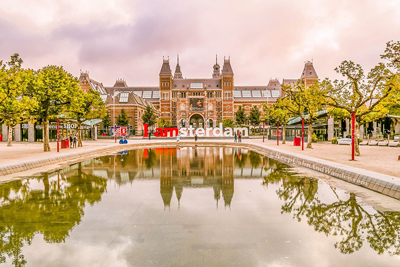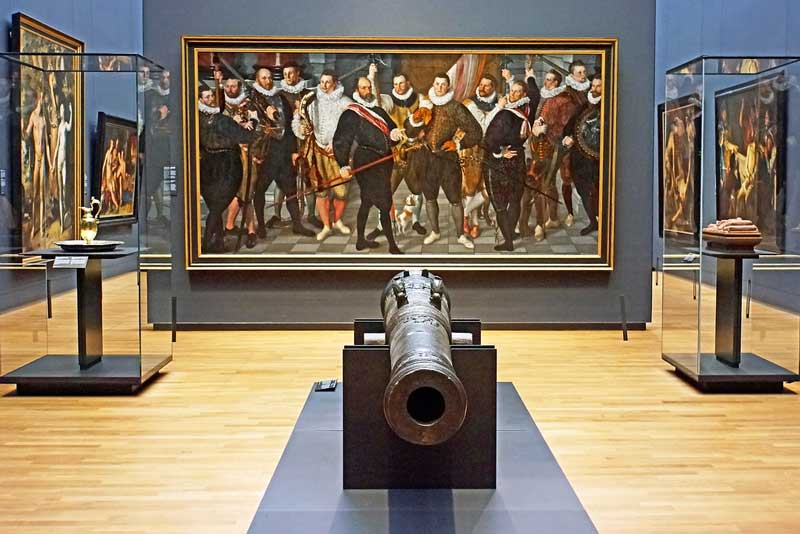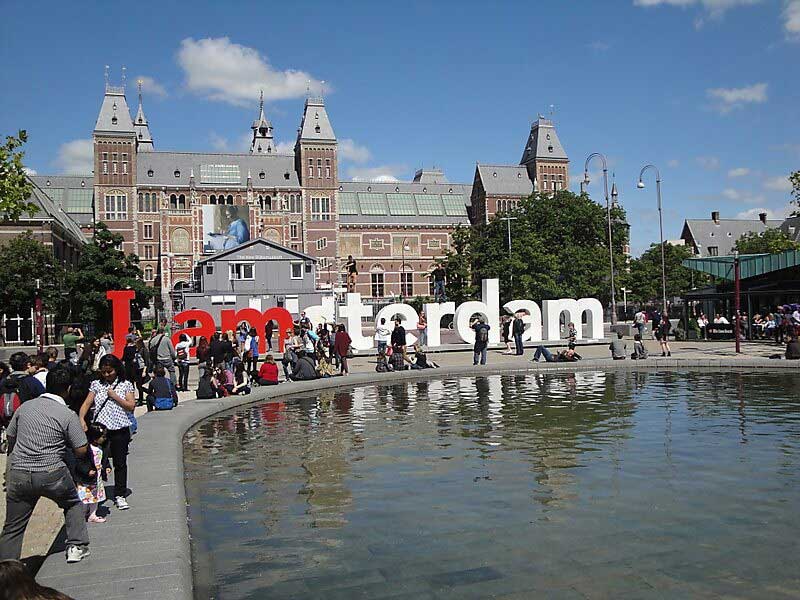
Dedicated to the art and history of the Netherlands, the Rijksmuseum or the National Museum in Amsterdam is located in the Museumplein or the Museum Square, close to the Van Gogh and the Stedelijk museums. The history of the museum started long back, when after the proclamation of the Batavian Republic in 1795, the government decided to found the museum on 19 November 1798. Accordingly, the National Art Gallery, the predecessor of the Rijksmuseum, was opened on 30 May 1800 in Huis ten Bosch, a royal palace in The Hague, with around 200 paintings and historic objects.
Although the National Art Gallery moved to the Prince William V Gallery in 1805, it wasmoved againto the Royal Palace of Amsterdam in 1808 by King Louis Bonaparte, brother of Napoleon Bonaparte. However, after the fall of Napoleon, the museum was shifted to the Trippenhuis, a neoclassical canal mansion in the centre of Amsterdam, built in 1666s as the double-house residence of the famous arms traders, Louis and Hendrick Trip and was opened to the public in 1817, as the Rijksmuseum te Amsterdam.

But within a short time, the old Trippenhuis mansionwas found to be unsuitable as a museum, the historical objects were moved to the Mauritshuis Art Museum in The Hague in 1820, while the important paintings were shifted to Villa Welgelegen in Haarlem in 1838. Nevertheless, since 1885, the museum is housed in the current Gothic-Renaissance revival main building, designed by Pierre Cuypers, who was also frequently associated with the Amsterdam Central Station.
Subsequently, the Rijksmuseum underwent numerous renovations and expansions and finally, the main building of the museum closed for a major renovation in December 2003.
The huge project, under the leadership of Spanish architects Cruz y Ortiz, successfully restored the museum to its 1885 appearance and the renovated main building was reopened by Queen Beatrix on 13 April 2013. Two weeks after that, the Queen arranged a gala dinner for the royalty of Europe in the museum’s Gallery of Honour, instead of the Royal Palace, among the great paintings of the Golden Age of the Dutch Republic, to emphasise the importance of the Rijksmuseum to the nation and the country.

Designed in Renaissance-Gothic style and constructed with brick and stone, the building of the Rijksmuseum has an ecclesiastical quality to it. However, with all its idolatrous images adorning the walls, a vaulted crypt in what was the original basement, stained glass, copious wall decoration depicting the glories and victories of Dutch art, it was poorly received by Protestant Amsterdam for being too medieval and too Catholic. Today, the building consists of two squares with an atrium in each centre and there is a passageway in the central axis with the entrances at ground level and the Gallery of Honour on the first floor.
The passageway forms a public right of way, which the people of the city used to access the new part of the city on the south side, from the old city on the north. The passage way has a cloakroom, shop, café and entrances to the galleries.

The Rijksmuseum has a total collection of around one million pieces of art dating from the Middle Ages to the 20th century, comprising of paintings, sculptures, drawings, applied artworks, clothes and historical documents. Although the collection is particularly strong in the 17th-century Dutch art, it also has a rich collection of many other major collections of other schools of western European painting and sculpture, as well as oriental art and the decorative arts. Along with the famous paintings by Rembrandt, Vermeer, Jan Asselijn, Van Gogh and many other Dutch artists, it also contains the works by various acclaimed artists of other countries like the Spanish romantic painter Francisco José de Goya and Italian painter of the Early Renaissance, Fra Angelico. Simultaneously, the works by Verhulst and Van der Schardt and other renowned sculptors are exhibited apace with the exquisite objects of applied arts.The museum also features a notable collection of Asian art and organises temporary exhibitions comprising of modern and contemporary art.

However, the Rijksmuseum is not only a museum containing artistic objects, it is a cathedral of arts that tells a story of Holland with its each floor depicting a chapter of history. The presentation of the artworks alongside artefacts derives from an approach to the history of art that describes a particular work as the product of its historical context rather than individual genius. Without a doubt, seeing the actual guns, cannons and models of ships depicted in the paintings themselves makes for a more engaging visit.

While medieval art and special collections, which include Delftware, a fleet of model ships, jewellery and arms, are exhibited on the ground floor of the Rijksmuseum, the first floor houses the 18th and 19th century masterpieces. Apart from that, the classic creations of the 17th-century are accommodated in the celebrated Gallery of Honour, located on the second floor of the museum. Strangely, the third floor in the attic, containing the small 20th-century exhibition, is split into two halves, each inaccessible from the other without navigating the stairs.

The Gallery of Honour, the world’s first permanent gallery to honour photography as a contemporary medium, is an extended corridor of the Rijksmuseum, consisting of 99 iconic photos that briefly tell the history of photography in the Netherlands from 1842 to the present day, plus one empty frame. During the visit to the Gallery of Honour, visitors can add their own choice of photo for the empty frame, with the help of a special app. The Gallery of Honour is directed towards the Night Watch Gallery, while the side alcoves belong to the masterpieces by the great artists of the seventeenth century and those alcoves are aesthetically framed by cast iron beams, inscribed with the names of the famous painters of the age.
Recognised as a national heritage site since 1970 and enlisted in the Top 100 Dutch heritage sites in 1990, the Rijksmuseum also contains a library, a shop and a cafeteria for the visitors.
